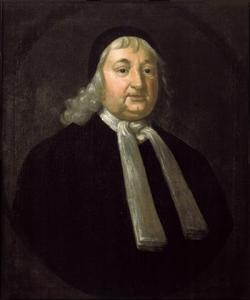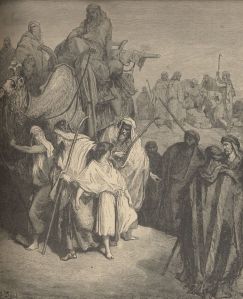From the Diary of Samuel Sewall 28 June 1689
Between 1688 and 1690, Samuel Sewall visited England. Had there been a phone book in his day, he might have visited everyone in it—and probably purchased something from every merchant in the yellow pages, too. Upon return to Boston in November 1689, he was hauling trunk after trunk of books, clothes, liquors, foodstuffs, hardware and myriad other items, some for personal use, some for resale.
Sewall’s travels involved more than business and pleasure, however. He is never out of touch with politics. While in England, Sewall tried to help his friend Increase Mather secure Massachusetts a Charter to replace the original. The conflicts involving the Dominion of New England and its impact on the daily lives and intellectual climate of the colonists weighed heavily upon Sewall.
His diary entry for 28 June 1689 reflects a heady mix of business, pleasure and politics. Sewall is in Cambridge, visiting the College and Catherine Hall, waxing gently on about its gardens and sundials and the little mill tucked in a grove of trees over by a good strong stream. We know where he ate: Saffron Walden, the saffron growing and trading centre. A merchant to the core, Sewall practically calculates his return on investment, noting that saffron roots can fetch “Ten Shillings a Bushel- about an Acre might yield an hundred pounds and more.”
By the end of the 28 June entry, Sewall’s mind is on politics: on the Glorious Revolution, the ouster of Edmund Andros from Boston, on the repudiation of the Dominion of New England. Over coffee, Sewall and Samuel Mather learned of the final days of the Dominion of New England. The two were “surpris’d with joy.”
On 27 June, Nathanial Byfield was licensed to publish his pamphlet, “An Account of the Late Revolutions in New England,” describing the Andros regime. The pamphlet was printed and distributed as rapidly as possible in London.
Byfield’s “Account” became a benchmark of historical perspective regarding the Dominion of New England and Edmund Andros’ regime. Sewall and Mather read that:
“Care was taken to load Preferments upon such Men as were strangers to, and haters of the People. . . . ; nor could a small Volume contain the Illegalities done by these Horse-Leeches in the two or three Years that they have been sucking of us;
“and what Laws they made it was as impossible for us to know, as dangerous for us to break. … It was now plainly affirmed … by some in open Council . . . that the people in New England were all Slaves. . . . Persons who did but peaceably object against the raising of Taxes without an Assembly, have been for it fined. . . . Without a Jury . . . some . . . have been kept in Imprisonment. . . .
“Because these things could not make us miserable fast enough, there was a notable Discovery made of . . . flaw in all our Titles to our Lands . . . and besides what Wrong hath been done in our Civil Concerns . . . the Churches everywhere have seen our Sacred Concerns apace going after them.”
Perhaps Sewall and Mather nodded in agreement with Byfield’s closing: “We commit our Enterprise unto the Blessing of Him, who hears the cry of the oppressed, and advise all our Neighbours, to joyn with us in prayers and all just actions, for the Defence of the Land.”













